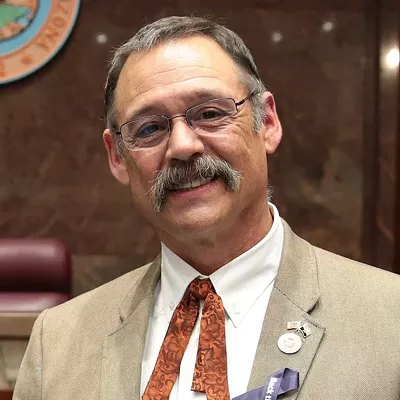Oh, sure, there's the occasional exception, like the gun-totin', girlfriend-fightin' Alan Lang, who so traumatized his staff after his election in 1992 that he ended up being named Worst Boss in America by a tabloid TV show.
Lang was so bad that he was knocked out of office two years later in an improbable recall election. Democrat Rick Lyons, who worked as an appraiser in the office for 24 years before winning the recall, has held the office ever since, restoring its dull character.
But after a decade, Lyons is calling it quits, saying, "Good politicians are like good guests--they leave before they're asked."
Lyons' retirement means that his office is the only open Pima County seat--and, given the general lack of competition in most other county races, also likely to be the only one in which voters will pick a fresh face.
The race pits Republican Bill Heuisler, who started raising hell about property taxes back in the late '70s, against Bill Staples, a longtime appraiser in the county's transportation department who's tight with Congressman Raul Grijalva. (Libertarian Rick "Scruffy" LaPoint is also on the ballot, but his general lack of interest in the details of the office, combined with a low-budget campaign on a third-party ticket, ensures he won't play a meaningful role.)
With all eyes on the presidential race, there's little sign voters or the media are paying much attention to the assessor's race. A candidate forum last week at El Rio Community Center, where hundreds have turned out in recent years for congressional and City Council forums, drew maybe 50 people, many of whom were partisans who had come to support their candidate.
It's a shame that so few people have an interest in the race, especially since the candidates have such a strong disagreement about the role of the office.
But there's one thing that the men seeking the office agree on: If Heuisler wins the race, the assessor's office will most assuredly being making headlines again.
The county assessor has one prime responsibility: overseeing the office that assesses property values that underlie tax rates set by the Pima County Board of Supervisors, local school districts and other jurisdictions that collect property taxes.
Heuisler's stated reason for getting into the assessor's race is as personal as it gets: He felt that two years of increased valuations on his home, of 10 and 12 percent respectively, was simply "ridiculous."
He lost his appeal of the valuation. So he decided to resurrect a campaign against property taxes that dates back nearly a quarter of a century.
Heuisler's argument goes like this: The steady annual rise of property values tied to the rapidly appreciating real estate market are driving Pima County property taxes through the roof. Even when governing bodies such as the Board of Supervisors don't increase tax rates, they still get a windfall, because the higher valuations means a higher property tax bill for homeowners.
Heuisler sees the rising property bills driving widows from their homes and businesses from Pima County. So he proposes to stop the tax hikes by breaking the link between the market and the county's assessment. He'd limit increases to property values to 1 or 2 percent a year, unless a house is sold.
"How can you assess a house based on what a person's going to sell it for?" he asks. "That's insulting. It is obscene."
His Democratic opponent, Bill Staples, says that Heuisler's proposal violates state law, which requires property appraisals to follow market values.
"The Department of Revenue is going to demand that you follow the law," Staples says. "It's not the opinion of the assessor as far as the values are concerned. It's the opinion of the market and your interpretation of the market."
But even if Heuisler's strategy were legal, Staples argues that it's still bad policy. He says tying property values to the market ensures that the tax burden is distributed more or less equitably among properties of similar value. Under Heuisler's proposal, neighboring houses that are identical in most respects could have sharply different tax bills based only on when they were last sold.
Heuisler acknowledges that his plan would create such disparities, but says that's "not my problem."
"Why do we as people care if it's a vastly different value for government purposes between someone who just bought his house and somebody who hasn't?" he asks. "People who intend to stay in their house until they die should be relatively left alone instead of having their house increase in value every year and being driven from their house."
Heuisler flat rejects the argument that equal values make for an equal distribution of the tax burden.
"Equitable distribution of the tax?" he asks. "Give me a break. We're not distributing taxes. Tax is something you do to people. You distribute services. You inflict tax burden."
If Staples is quietly skeptical of Heuisler's arguments, the outgoing assessor is downright dismissive of them. Lyons, who has been sharply criticized by Heuisler for his policy of following the market in values, is sharply critical in return.
"This notion of older people being driven out of their homes is all pandering and nonsense," says Lyons, who points out there are several programs that allow widows and low-income seniors to get property-tax breaks. "It's the classic method of using the myths of the process to pander to the lesser angels of human nature."
At the heart of Heuisler's case is a section of state law that reads, "If the methods and techniques prescribe using market data as an indication of market value, the price paid for future anticipated property value increments shall be excluded." Heuisler interprets the law to mean that assessing homes on the basis on market increases violates the law.
But Lyons, who remains confident that he's been following the law properly for the last decade, counters that the courts have determined that "future market value" relates to the classification of the property. In other words, if a home sells at an unusually high amount because it happens to be at a prime commercial corner and could be redeveloped into a higher-value fast-food restaurant, it still should be valued as a home despite the distorted price. Additionally, if someone has paid more than market value for the property expecting to transform it into a taco shack, that sale should be excluded from comparables used to establish value.
"Bill is a layman and hasn't any background in the work and has views of these matters that are not only erroneous but a bit self-serving," says Lyons, who adds that the assessor's job is to assess property values, not set policy.
Heuisler's response: "Then why in the hell do we elect the assessor? If we elect the assessor, and he doesn't do what we want him to do, then we get rid of him and get somebody who does."
Heuisler agrees that the Department of Revenue could order him to adjust values if he changes the current method of keeping pace with the market. Then, he says, he'll go to court with his interpretation of the law. He predicts the case to draw such spectacular attention that he'll be able to lobby the Arizona Legislature for a clarifying law that will show he's right.
Lyons offers a different forecast: The state Department of Revenue declares that the values are inaccurate and tells Heuisler to change them. He refuses, the case goes to court, and Heuisler loses, wasting taxpayer dollars on both sides.
Nor, argues Lyons, is Heuisler likely to find relief at the Arizona Legislature, mostly because freezing property values would likely lead local governing bodies, such as the Board of Supervisors or local school boards, to raise property tax rates. That presents a problem for the state, because the 1980 reform capped cumulative tax rates, meaning that once homeowners hit a certain level, the state steps in to cover additional taxes through the general fund. With many taxpayers in Pima County already at or beyond the cap, any rate hike at this point would push the costs onto the state--an alternative that would not be easy for lawmakers to swallow.
"I don't know how much Bill really understands about all this, but, apart from being disingenuous, he's also politically naïve," says Lyons.
Staples says his agenda for the office is less grandiose than launching a revolution against the current property-tax system.
"There are some things I'd like to change, but I think I would do things differently than my opponent," Staples says. "I'm not going to go hell-bent on one issue that I don't think has any chance of passing."
Staples says he'd like to challenge the so-called "rent-a-cow" scheme, which allows developers who have rezoned land for high-density development to pay next to nothing in property taxes by running cattle on the property and claiming an agricultural exemption.
Staples says he'd also push to reclassify billboards so that their value better reflected their worth to billboard companies and try to do more outreach so that more seniors can learn about eligibility for property-tax programs.
"I think the office is professionally run," he says. "To say that my opponent and I view the office differently is probably an understatement."
Republican Bill Heuisler
Bill Heuisler has been many things: A U.S. Marine, a tire salesman, a Tucson police officer and a private investigator. He's written four unpublished novels and runs a small-time literary agency. His résumé says he's tracked down bail jumpers across the border, dabbled in Mexican beachfront real estate investment and even worked with the CIA on efforts to overthrow Fidel Castro. (A Web search shows he was one of X men busted while planning to invade Haiti back in the mid-'60s.)For the last quarter century of so, Heuisler has also been a fierce opponent of rising property taxes. After California voters approved the legendary Prop 13, which addressed rising property taxes by essentially freezing property values until homes were sold, Heuisler led a similar initiative effort, Citizens for Tax Relief, in 1980. But the Arizona Legislature came up with an alternative proposal that provided a state rebate on property taxes once they crossed a threshold. Voters passed that proposal in a special election, deflating support for Heuisler's proposal, which lost on Election Day.
Heuisler next took failed runs for the Tucson City Council and the Pima County Board of Supervisors before latching on to a winning campaign. He coordinated the Southern Arizona campaign for Evan Mecham, the controversial Republican governor whose reign ended with impeachment by the Arizona Legislature. Heuisler, who describes his role in the Mecham Administration as a special investigator rooting out waste, fraud and abuse in state agencies, still complains that Mecham was railroaded out of office.
After the Mecham affair, Heuisler toned down his political activity, although he does mention that Republicans who voted to impeach Mecham were all subsequently defeated. It wasn't until he got rising property assessments for his home--and lost a round of appeals--that his interest in politics flared up.
"Who better than me?" Heuisler asks. "I know the system. I know the flaws in the system."
Democrat Bill Staples
Back when Bill Heuisler was working to transform the property tax system, Bill Staples was taking classes and playing Frisbee at the UA. Staples, 44, was still in high school when he got his first look at Tucson, passing through on his way to a national Frisbee championship in Pasadena. When he graduated from high school in 1979, cheap tuition and sunny weather brought him back to attend classes at the UA.Although he studied business and engineering, Staples never earned a degree from the UA. He got into residential real estate and then into politics, thanks to an old Frisbee buddy, Glenn Miller, who in 1988 persuaded him to sign on the campaign of a school board member, Raul Grijalva, who was seeking a seat on the Pima County Board of Supervisors.
In 1989, shortly after Grijalva was sworn into the District 5 seat, Staples went to work for the county's transportation department, where his duties largely consisted of appraising properties that the county wanted to acquire for road widening or flood-control efforts.
Staples remained close to Grijalva, who appointed him to the county's Planning and Zoning Commission in 1997 and re-appointed him for a second term in 2001, shortly before the Democratic supervisor resigned to successfully seek a congressional seat.
Staples says he's running for assessor because, "I love this place. I've watched it grow up. ... I don't like the direction that Phoenix and some of the Republicans are taking us, and I'd like to do my part."
Staples landed Grijalva's endorsement in his first run for office, and the candidates are sharing space, along with Supervisor Richard Elias, in a midtown office.
Despite his work as a cog in the Grijalva machine, Staples says he doesn't have aspirations to move up the political food chain.
"Assessor seems like a fairly low-profile, fairly straightforward office," Staples says. "I'm not looking for stepping stone. I'm an appraiser."











